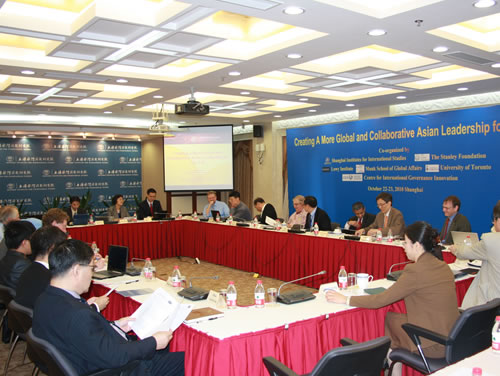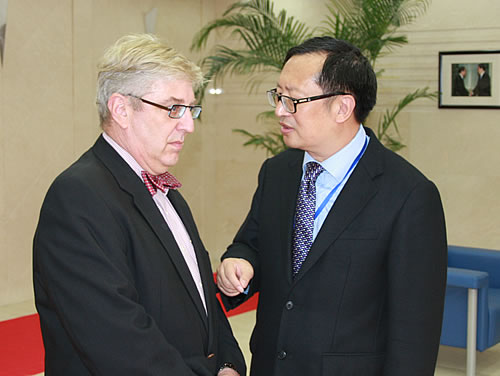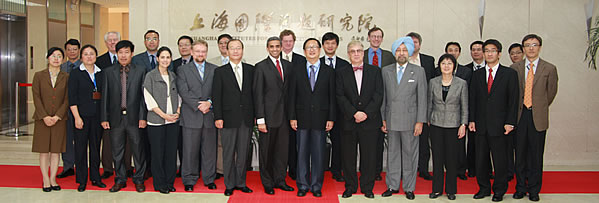Creating A More Global and Collaborative Asian Leadership for the G20



Creating A More Global and Collaborative Asian Leadership for the G20
Oct 21-25, 2010
Agenda
October 21, 2010 (Thursday)
Conference Participants arriving in Shanghai
18:00 Working Dinner
Venue: First Floor, Building A, Ramada Plaza Caohejing
October 22, 2010 (Friday)
08:40 Taking Bus at Hotel Lobby to Conference Venue: SIIS,195-15 Tianlin Road
09:00-09:05 Opening: Welcoming Remarks
Prof. Yang Jiemian, President, SIIS
Alan Alexandroff , Senior Fellow, CIGI
09:05-10:20 Session I: The G20 global governance agenda – Seoul Summit
Korean officials have made clear the major subjects for the agenda for the Seoul summit: prior commitments, development and financial safety net. This panel will discuss national perspectives on these issues and whether this agenda possesses the basis for collaboration? Do experts agree that the scope identified is adequate or in fact should the agenda be enlarged? Can the agenda/should the agenda extend to climate change and or proliferation? Do the discussants believe that the G20 is achieving the steering committee status envisaged at Pittsburgh? Or, does the G20 remain a crisis committee where the abating of the economic crisis is undermining collective efforts especially in the financial regulatory area and in dealing with global imbalances?
Chair – Chen Dongxiao
Discussants - Nina Hachigian, Ding Jianpin, Lee Dong-hwi, Amb. Vanu Gopala Menon
10:20-10:40 Group Photo and Coffee Break
10:40-11:40 Session II: Perspectives from the large emerging powers –China, India, and Indonesia
What are the matters/issues that these countries believe are vital for success? Do they see themselves acting in concert with other large emerging market countries? Or, do the ‘alliances’ run differently? Are these countries prepared to take a lead, or more formative role, in achieving success of an issue(s)? What issues do these countries believe must not be put on the table in order to avoid conflict and contention among the leaders?
Chair: Malcolm Cook
Discussants: Chen Dongxiao, H.S. Dillion, Yu Wan Li
12:00-14:00 Lunch 2nd Floor, Bulding A, Ramada Plaza Caohejing
14:00-15:10 Session III: Perspectives from the Summit host – Korea
This session gets insights from our colleagues from Korea. Is Korea making progress in achieving success with the agenda items? Where are the successes and problems currently? Who presents difficulties in overcoming the inability to achieve collective action? What issues may come onto the agenda once the leaders gather no matter what the agenda is? Does Korea view the Seoul summit as likely to be a success - at this point? What will make it more likely that Seoul can achieve success?
Chair: Alan S Alexandroff
Discussants -Lee Dong-hwi Lim Won-hyuk
15:10-15:30 Coffee Break
15:30-17:00 Session IV: Perspectives from the advanced economy countries –Australia, Japan, and United States
Is like-mindedness driving the behavior of these three countries and establishing the bonds that make cooperation possible? Are these countries in fact able to collaborate? If not what is keeping them apart? And do they see other partnerships and collaborations as more central for their leaders? How important do these countries see the role of the G8? Does the G8 impede current efforts to make the G20 the steering committee for global economics? ls representativeness, or its lack the central problem? Has domestic politics simply overwhelmed their abilities to collaborate either with the other traditional powers or even the new enlarged leadership?
Chair: Keith Porter
Discussants - David Shorr, Nina Hachigian, Malcolm Cook
17:30-19:30 Dinner
Venue: Private Room, Third Floor, Building A, Ramada Plaza Caohejing
October 23, 2010 (Saturday)
08:40 Taking Bus at Hotel Lobby to Conference Venue: SIIS,195-15 Tianlin Road
9:00-10:10 Session V: Perspectives from other participants – Singapore and Vietnam
Have their countries and leaders been able to make their views and preferences known to the members of the G20? What needs to be done to the outreach process to correct for this? Have their roles in regional organizations - ASEAN, 3G in particular, made them better able to identify their preferences with the G20? Who among the G20 is most approachable by their own leadership?
Chair - Chen Dongxiao
Discussants - Nguyen Manh Cuong, Amb. Vanu Gopala Menon
10:10-10:30 Coffee Break
10:30-12:00 Session VI: Moving toward collaborative leadership – process and substance. Is it possible?
Is the G20 on track to meet the challenges before it, especially with regard to global financial reform? If it is not, what do they believe is necessary to put the G20 on track to achieve success? What is the likelihood of making these course corrections in order to make the G20 a success in Seoul and beyond and to create the prospect that the G20 will achieve the permanence and leadership envisaged at Pittsburgh?
Chair: Alan Alexandroff
Discussants: Xu Mingqi, all other experts
12:00-14:00 Lunch 2nd Floor, Bulding A, Ramada Plaza Caohejing
2016/09/10 read:476
October 21 to 23, SIIS co-organized the conference “Creating A More Global and Collaborative Asian Leadership for the G20.” with Stanley Foundation, Center for International Governance and Innovation (CIGI) and Lowy Institute for International Policy. Experts and scholars from China, the United States, Canada, and other Asian countries gave perspectives on the forthcoming G20 Seoul Summit.



Creating A More Global and Collaborative Asian Leadership for the G20
Oct 21-25, 2010
Agenda
October 21, 2010 (Thursday)
Conference Participants arriving in Shanghai
18:00 Working Dinner
Venue: First Floor, Building A, Ramada Plaza Caohejing
October 22, 2010 (Friday)
08:40 Taking Bus at Hotel Lobby to Conference Venue: SIIS,195-15 Tianlin Road
09:00-09:05 Opening: Welcoming Remarks
Prof. Yang Jiemian, President, SIIS
Alan Alexandroff , Senior Fellow, CIGI
09:05-10:20 Session I: The G20 global governance agenda – Seoul Summit
Korean officials have made clear the major subjects for the agenda for the Seoul summit: prior commitments, development and financial safety net. This panel will discuss national perspectives on these issues and whether this agenda possesses the basis for collaboration? Do experts agree that the scope identified is adequate or in fact should the agenda be enlarged? Can the agenda/should the agenda extend to climate change and or proliferation? Do the discussants believe that the G20 is achieving the steering committee status envisaged at Pittsburgh? Or, does the G20 remain a crisis committee where the abating of the economic crisis is undermining collective efforts especially in the financial regulatory area and in dealing with global imbalances?
Chair – Chen Dongxiao
Discussants - Nina Hachigian, Ding Jianpin, Lee Dong-hwi, Amb. Vanu Gopala Menon
10:20-10:40 Group Photo and Coffee Break
10:40-11:40 Session II: Perspectives from the large emerging powers –China, India, and Indonesia
What are the matters/issues that these countries believe are vital for success? Do they see themselves acting in concert with other large emerging market countries? Or, do the ‘alliances’ run differently? Are these countries prepared to take a lead, or more formative role, in achieving success of an issue(s)? What issues do these countries believe must not be put on the table in order to avoid conflict and contention among the leaders?
Chair: Malcolm Cook
Discussants: Chen Dongxiao, H.S. Dillion, Yu Wan Li
12:00-14:00 Lunch 2nd Floor, Bulding A, Ramada Plaza Caohejing
14:00-15:10 Session III: Perspectives from the Summit host – Korea
This session gets insights from our colleagues from Korea. Is Korea making progress in achieving success with the agenda items? Where are the successes and problems currently? Who presents difficulties in overcoming the inability to achieve collective action? What issues may come onto the agenda once the leaders gather no matter what the agenda is? Does Korea view the Seoul summit as likely to be a success - at this point? What will make it more likely that Seoul can achieve success?
Chair: Alan S Alexandroff
Discussants -Lee Dong-hwi Lim Won-hyuk
15:10-15:30 Coffee Break
15:30-17:00 Session IV: Perspectives from the advanced economy countries –Australia, Japan, and United States
Is like-mindedness driving the behavior of these three countries and establishing the bonds that make cooperation possible? Are these countries in fact able to collaborate? If not what is keeping them apart? And do they see other partnerships and collaborations as more central for their leaders? How important do these countries see the role of the G8? Does the G8 impede current efforts to make the G20 the steering committee for global economics? ls representativeness, or its lack the central problem? Has domestic politics simply overwhelmed their abilities to collaborate either with the other traditional powers or even the new enlarged leadership?
Chair: Keith Porter
Discussants - David Shorr, Nina Hachigian, Malcolm Cook
17:30-19:30 Dinner
Venue: Private Room, Third Floor, Building A, Ramada Plaza Caohejing
October 23, 2010 (Saturday)
08:40 Taking Bus at Hotel Lobby to Conference Venue: SIIS,195-15 Tianlin Road
9:00-10:10 Session V: Perspectives from other participants – Singapore and Vietnam
Have their countries and leaders been able to make their views and preferences known to the members of the G20? What needs to be done to the outreach process to correct for this? Have their roles in regional organizations - ASEAN, 3G in particular, made them better able to identify their preferences with the G20? Who among the G20 is most approachable by their own leadership?
Chair - Chen Dongxiao
Discussants - Nguyen Manh Cuong, Amb. Vanu Gopala Menon
10:10-10:30 Coffee Break
10:30-12:00 Session VI: Moving toward collaborative leadership – process and substance. Is it possible?
Is the G20 on track to meet the challenges before it, especially with regard to global financial reform? If it is not, what do they believe is necessary to put the G20 on track to achieve success? What is the likelihood of making these course corrections in order to make the G20 a success in Seoul and beyond and to create the prospect that the G20 will achieve the permanence and leadership envisaged at Pittsburgh?
Chair: Alan Alexandroff
Discussants: Xu Mingqi, all other experts
12:00-14:00 Lunch 2nd Floor, Bulding A, Ramada Plaza Caohejing
